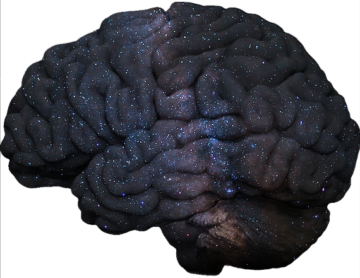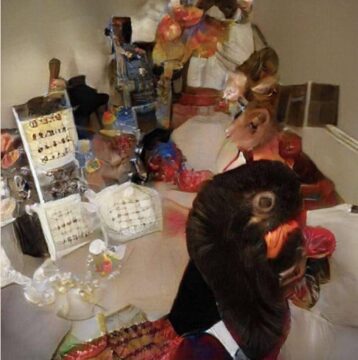by Jochen Szangolies
 In the previous column, I took Philip Goff’s latest offering Why? The Purpose of the Universe as a jumping-off point to present some of my own rumination on life, the universe, and what it all means. While that prior installment was mainly concerned with looking outward, into the wider cosmos, here, I’ll turn my gaze inward, to riff on Goff’s case that the reality of conscious experience implies a larger purpose to, well, everything.
In the previous column, I took Philip Goff’s latest offering Why? The Purpose of the Universe as a jumping-off point to present some of my own rumination on life, the universe, and what it all means. While that prior installment was mainly concerned with looking outward, into the wider cosmos, here, I’ll turn my gaze inward, to riff on Goff’s case that the reality of conscious experience implies a larger purpose to, well, everything.
Goff’s ultimate conclusion should be attractive to many: rather than being thrown by mere random chance into the cold and uncaring void of the universe, to live out a brief, confused existence and then wink out into the nothingness whence we came, the existence of complex life in the world is due to a larger purpose, an overall arc that bends into the direction of greater objective value. Moreover, rather than going the traditional route and appealing to some omniscient, omnipotent, and omnibenevolent creator God that sees to it that everything unfolds according to His divine (and commonly, unfathomable) design, he proposes a way to reap those benefits without all the boring Sunday prayer sessions!
Thus, he breaks largely untrodden ground: proposing a middle way between a scientific, materialist, but ultimately uncaring cosmos, and a world unfolding according to a divine, but irreducibly mysterious, purpose. Just as evolution can give us design without a designer, he proposes meaning without a meaner. If this were a religion, I could well see myself signing up for it—but since it’s not, I don’t even have to do that! However, as also hinted at in the last column, the more alluring the conclusion, the more we have to critically examine the arguments leading up to it.
Who would not be at least a little flattered by the thought that, through their very life, they are advancing the cosmos just a tiny little bit towards its ultimate purpose? And then there’s the additional benefit that, in Goff’s telling, accepting such an enlightened spirituality might be a way back to the (undeniably real) benefits of a spiritual community—partaking in ritual, strengthening social bonds, and simply enjoying the mere experience of getting together with others without being focused on some immediate end.
So what, then, is the catch? Even in Goff’s cosmos, meaning doesn’t come for free. But the price that’s paid is an ontological one: whatever is not reducible to the bare material facts is added on to the fundamental furniture of the world. Goff is a proponent of panpsychism, and thus believes that consciousness, rather than being a product of the spongy lumps of tissue we call ‘brains’, is present in everything, from the smallest particle to—perhaps—even the cosmos as a whole. That he takes the evolution of the world to move towards greater value also commits him to a position of value realism—value must be a real thing to serve as a goal. These are both philosophically embattled positions, but I think the proposal which will elicit the greatest resistance is his pan-agentialism: the notion that not just consciousness, but even goal-directed (‘agential’) behavior is part and parcel of the fundamental makeup of the world.

I’m not, ultimately, strongly opposed to any of these stances in particular. What concerns me more is the mode of explanation at work here: whenever faced with a mystery, it seems, it is just taken to be a brute fact, and added to what Australian philosopher David Chalmers has called the ‘scrutability base’—the set of fundamental facts from which everything else can be derived. (See this previous column for some discussion on what kind of world might be scrutable from such facts.) This ultimately carries the risk of jumping the gun—what if whatever we add to the base facts turns out to have a further explanation after all, and we just haven’t been smart enough to find it yet? After all, the history of science is littered with the discarded shells of concepts—the luminiferous ether, caloric fluid, élan vital—once thought fundamental. Moreover, there always is an aura of cheapness that surrounds such a maneuver: responding to the question ‘How did the rabbit get into the hat?’ with ‘It was always already in there.’ might be an answer in the technical sense, but does little to dispel the mystery.
That’s not to say that Goff doesn’t present good reasons for his positions. He’s trying to thread a very find needle, and perhaps, the reason this hasn’t been done before is just that it requires a commitment to positions scarcely considered. On that account, his boldness to go where his arguments seem to lead him is nothing but commendable.
But why does he find himself holding such weird beliefs? His argument rests on two main pillars. The first is the fine-tuning argument considered previously: the universe looks like it’s tailor-made for life—maybe that’s because it actually is. Here, I want to take a look at the second: our conscious experience is in sync—in psycho-physical harmony—with our behavior. That’s really weird, from a materialist-reductionist point of view, but it can be a bit of a challenge to tease out exactly why that is the case.
Harmony Of The Spheres
It seems to be the most natural thing in the world: the stove is hot, I accidentally touch it, and burn myself; and because of that, I jerk back my hand and emit some string of choice expletives. But, Goff argues, if the world is merely physical—if everything is reducible to, ultimately, the bumping of particles or the rippling of quantum fields—then this picture is radically unlikely to come along.
To illustrate this, he introduces the idea of a meaning zombie—a being that, while possessed of phenomenal experience (i.e. consciousness), lacks any meaning attached to this experience: in the words of US-American philosopher and psychologist William James, it is just a ‘buzzing, blooming confusion’. Hence, this ‘m-zombie’ is a sort of halfway house between a fully conscious being and the ‘p-zombies’ introduced by the already mentioned Chalmers—creatures which lack any sort of phenomenal experience, yet are physically and behaviorally identical to us.

Goff’s m-zombies are likewise our behavioral twins, which means that there is no relevant difference between us and them as far as reproductive fitness is concerned—whatever you do, your m-zombie-twin would do in exactly the same way, and thus, evolution has no handle to differentiate between the two of you. M-zombies have the same functional understanding—they show behavior appropriate to the stimuli they’re met with. But they lack experiential understanding: their experience is not experience of something, of pains, elephants, the meaning of the word ‘love’ or the way a conclusion follows in a difficult mathematical argument. Rather than being parceled up into distinct concepts, theirs is a ‘raw’ experience.
The crucial point now is to realize that this experiential understanding is not necessary for merely functional understanding—for merely displaying appropriate behaviors. As long as everything is causally ‘hooked up’ in the right way, such an m-zombie will duplicate every behavior of the original version.
The argument has the distinction of being both simple and subtle, which I believe goes some way towards explaining that it is mostly met with outright disbelief. We run away from lions because we fear them because they might harm us; hence, we’re not eaten, thus live to procreate another day, thus pass on our proclivity towards this fear. But again, what’s needed for natural selection is just the running away, not the belief.
If we thus don’t want to appeal to any supernatural agency that, like in Leibniz’ pre-stabilized harmony, just arranges mind and world such as to fit together, we have to find a behavioral impact for our beliefs—we have to ensure that what matters for our survival is experiential rather than merely functional understanding. This, however, turns out to be a difficult task: on any standard materialist account, once you get the right particles into the right configuration, the right things happen, without any word needing to be said about the semantic aptness of our experience.
This is then what pushes Goff to propose that goal-directed behavior must, in some prototypical form, already be present at the bottom layer of the world, whatever that might turn out to be. Thus, particle behavior—if that bottom layer is made of particles—is dictated, ultimately, by rational responses to their experience. ‘Rationality’, here, has a meaning of being distributed according to degrees of aptness—it is more rational to pursue what you favor, and avoid what you disfavor. But particles are very simple things, with appropriately simple inclinations—which is why they’re eminently predictable, and ultimately always end up behaving according to simple laws: they have no complex machinery to consider alternatives and courses of action, but always act immediately according to their proclivities.
But now, with particles free to act on behalf of their inclinations, we have a leverfor experiential understanding to influence behavior, and become causally efficacious, thus available to evolution’s grasp. For while a particle can do little with its proclivities but act upon them, a complex being with experiential understanding can weigh its options, investigate different courses of action, and then choose appropriately—something that an m-zombie, by contrast, can’t.
This has another, surprising implication: given that an m-zombie’s actions are wholly determined by the behavior of the particles constituting it, and the behavior of a fully conscious human being potentially differs from that of the m-zombie, this must mean that the behavior of said human being is not fully reducible to that of their constituent particles. And that’s indeed the conclusion Goff draws: the laws of physics don’t fully determine the behavior of conscious agents.
More specifically, he proposes that in general, the Born rule, which governs how to calculate the probabilities of certain observations from the quantum state of a system, may be violated for conscious agents. While particles in their simplicity always act in predictably regular ways, more complex beings are, in principle, free to choose otherwise, and choose between alternatives with probabilities different from what a straightforward application of the Born rule would yield. Excitingly, this means that in principle, this is a proposal that’s subject to empirical testing—although the practical difficulties are likely to be prohibitively great for any near-future experiments.
Goff’s willingness to follow his arguments to their conclusion, here, is certainly to be admired. He responds to a difficulty few have so far seen with a proposal that will be acceptable to fewer, that yields a consequence that just might alienate the rest!
But it’s now time for me to fully renounce all pretense at intending nothing but a review of Goff’s arguments, and reveal that secret, silent urge that has compelled reviewers and critics alike, since probably the first word has been put to paper: the jaundiced feeling deep down that, but for time and opportunity, one could have done better. I don’t think that Goff is really compelled to admit consciousness and agency among the fundamental features of the world, and yet, might reap many of the same benefits. In particular, I believe that there is a unique way to keep a broadly materialist commitment, while offering the resources to reply to the Darwinian argument. (I make no claims on being able to write a better book than Goff, however.)
A Fixed Point Of Meaning

On my model of the mind, a mental state is a certain kind of self-reproducing construct—a pattern in the brain producing new patterns in the brain. The aim of this construction is to overcome the notorious ‘homunculus problem’: if mental states are about the world by representing it, this seems to imply some entity it is represented to—an audience in the Cartesian theater. But how does that entity perceive it, if to perceive something is to represent it?
This yields an infinite regress; but the same regress exists in a naive account of reproduction: if there is a ‘miniaturized’ version of the entity already present (the doctrine known as ‘preformationism’), awaiting its birth, then that must itself contain yet smaller versions, and so on, ad infinitum. This dilemma is solved—in full, originally by the Hungarian-American physicist and polymath John von Neumann—by means of giving the replicator access to its own description, and dividing the process of reproduction into the syntactic step of copying this description, and the semantic step of interpreting it, constructing its own copy.
A similar solution works for mental representations. By giving such a representation—a symbol—access to its own description, it represents itself to itself—thus, the distinction between the representation and the interpreter of that representation evaporates, and with it, the circularity.
But such a symbol seems at first a strange and paltry thing, a mere frame, representing itself, but nothing else—a representation without real representational content. It does not point to the world beyond, but only at itself. However, there is a way out of this closed loop: in the formal analysis, such a replicator constitutes a self-referential statement; and by the remarkable fixed-point theorem of provability logic—which governs what sort of inferences the replicator can draw, thus describing what it ‘knows’—such propositions can be shown to be equivalent to other propositions that have the self-reference eliminated.
This is a little abstract (the full story is in this paper, and a more careful introduction in this column), but there is a fairly well-known example: the incompleteness theorems due to Austrian logician Kurt Gödel. The first incompleteness theorem revolves around the construction of a sentence G that asserts the non-provability of G. By the fixed-point property, this self-referential construction should be equivalent to one from which the self-reference is gone: and so it is. In fact, G is equivalent to the consistency of the system in which it is formulated, yielding the second incompleteness theorem (and moreover, this equivalence is provable within that system). We may thus stipulate that, in this sense, G is a symbol representing that inconsistency—it has a content that points beyond itself, but it only has that content due first and foremost to its self-referential nature.

The self-referential propositions that the von Neumann replicators encounter are of a somewhat more complex nature: essentially, they stipulate that a certain action will be taken if, and only if, that action can be proven to produce a given goal. (Here, the goal should be understood as an appropriately formalized description of the desired state of the world.) But the fixed point of that proposition then turns out to be the goal itself—that is, the referential content of a mental state aimed at producing a certain goal turns out to be that very goal! Whether a given action is taken then depends on that goal—on the description of a desired state of the world.
This gets us halfway to Goff’s experiential understanding—it’s only the experiential part that’s still missing. To include this, we must note that the replicator, acting only on a theoretical description of itself, could never decide whether to take any action—the proposition that corresponds to doing so is formally undecidable, in the same way that the Gödel sentence G is. This is where an extension of the base facts of the world also becomes necessary on my model: beyond the merely formal, the theoretical, the model needs certain intrinsic properties to exist. These play essentially the role of structure-bearers: they are the relata that figure in the relations that are discovered by scientific inquiry. Whenever we make a measurement, we make a certain kind of comparison: of length, of mass, or of duration. Thus, what enters into scientific knowledge are ultimately only the relations of objects to one another, leaving what Arthur Eddington, who obtained the first experimental evidence for general relativity, called the ‘inner un-get-atable nature’ of matter undetermined.
It’s these un-get-atables that are ultimately present in experience—but only when brought under the self-referential purview of the von Neumann replicator. Hence, my view is not quite panpsychist: matter does not have an inner experiential character, but science only describes matter’s relational structure, and what underlies this structure, if reflected back upon itself, becomes experiential in character. This gives the replicator access to its own properties that goes beyond what merely having a theory of itself could provide. It does not need to theoretically establish a certain goal (recall that this goal is equivalent to the proposition of taking action to bring it about), it merely needs to have it, its truth established by introspection rather than deduction. Hence, that we have an experience of a certain state of the world we desire to bring about is what causes us to take action to bring it about—this, then, is experiential understanding in full.
Each such action then is a creative act, a new fact not reducible to the prior state of the world, not deducible from it via theoretical, mechanistic means. At the bottom, we are replicating patterns that aim to decide undecidable propositions, bringing novelty into being; but our resulting self-experience is that of agents engaged in bringing desired goals about. Our agency is directed at our goals, but the precondition to this agency is the creation of irreducibly novel facts—like adding the Gödel sentence to a formal system to produce a new, more powerful one.
